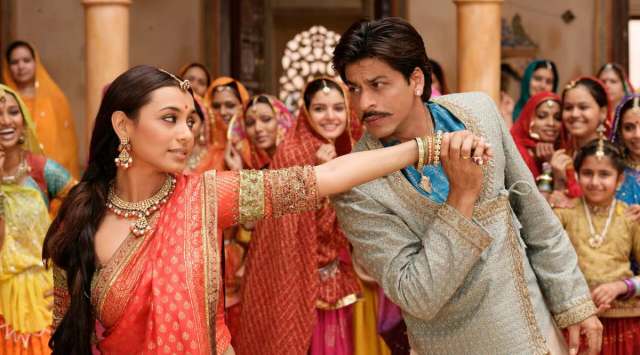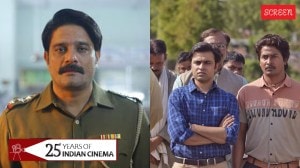Click here to follow Screen Digital on YouTube and stay updated with the latest from the world of cinema.
Revisiting Shah Rukh-Rani’s Paheli: Amol Palekar comments on consent, choice and respect in a world of macho Bollywood masala
Paheli was the new-age fairytale that Amol Palekar introduced in a world of thumping Bollywood drama. He showed the different side to Shah Rukh Khan and Rani Mukerji, which was far away from masala and melodrama.
 Shah Rukh Khan and Rani Mukerji in Paheli (Photo: Netflix)
Shah Rukh Khan and Rani Mukerji in Paheli (Photo: Netflix)The year 2004 was a glorious one for Shah Rukh Khan. Within a span of one year, he had starred in three completely different films — ranging from the Bollywood masala Main Hoon Na that was directed by Farah Khan, the emotionally pulsating romance Veer Zaara and Ashutosh Gowarikar’s rousing Swades. It was probably one of the finest years in his career, as he had already established his brand of romance and masala and he had nothing to prove to anyone anymore. SRK also produced the film.
Yet, Amol Palekar had something different planned for him. In 2005, he starred in Paheli with Rani Mukerji, who was also riding the wave of success as well at the time, with numerous hits to her credit. It was an unusual choice for the pair who had featured in the romantic drama Chalte Chalte just two years ago, which revolved around a husband and wife constantly at odds with another. Amol Palekar brought them together again, but with a fresh flavour of a medieval Rajasthani folktale that sees a ghost falling in love with a new bride.
While it was something new for SRK and Rani, Paheli also stands out in Palekar’s filmography. He had made a name for himself with films that were subdued in their vibrancy, brought about stories of complex relationships and woven simplistic romances from the ordinary life, namely Thoda Sa Roomani Ho and Anaahat. However, Paheli, with its rich landscape, detailed and colourful costumes and jewellery, was rather unlike what he had done before. The music of the film captured the tone of the film, and alternated between upbeat and romantic tracks. The dialogues were subtle and hardly excessive—with several memorable lines, including when Rani tells the ghost who lavishes love on her, “You are saying this because you are a ghost. Had you been human, you wouldn’t have said something so nice.” The film is imbued with heavy symbolism regarding patriarchy and women’s performative roles in society, and portrays its message quietly without spoon-feeding the audience.
In Paheli, SRK and Rani were a married couple again—but this time, it wasn’t so simple as it sounds. Shah Rukh played the role of a shape-shifting ghost, who is so enchanted by new bride Lachi (Rani) that he takes the form of her business-minded husband, who leaves just after marriage. The ghost reveals himself to her immediately and asks her, if she would still accept him. Lachi tearfully explains that no one has ever asked for her consent before, and readily accepts him. The story follows the romance of Lachi and this considerate ghost and twists the rules of supernatural believability as the two conceive a child together.
Turning tables on old fairytales
Apart from touching upon themes of consent, Paheli deconstructs a woman’s desires—as Lachi is faced with a dilemma, should she wait for her uncaring husband for five years, or should she revel in this newfound reciprocity of love with a spirit? She chooses the latter; she would rather be with a shape-shifting spirit who loves her, and is kind, caring to her family. He is everything that her husband isn’t—a man who had left her after marriage, furthering the idea that women should wait in subservience for their husbands. The ghost is what she has always wanted in a husband—humorous, affectionate and caring to everyone around him.

Dismantling the staid patriarchal rules set in stone for women, she decides on a life of love and passionate fulfilment, rather than continuing traditions of self-sacrifice and martyrdom. In a gentle, yet delightful way, Amol Palekar turns the tables on the old fairytales, and presents a dreamier one, where the women have more liberty to exercise their choice. At the end of the story, she is reunited with the ghost, who has taken the place of her husband, again.
There has been much discussion on whether Paheli is entirely feminist, as it was projected as a story that focussed entirely on the woman. This is partly true. It was ahead of its time in 2005 for sure, as mainstream Bollywood was too busy with macho heroes and films focussing on women were rather few and far in between. Paheli aimed to keep the women’s agency in the foreground and was partly successful, even if the men finally took centrestage halfway through the film. Nevertheless, it was still progressive for a film to delve into the nuances of a woman’s desires, without being overtly explicit and expository. The film had impactful and subtle dialogues that were rather rare to hear at the time, including a broken Lachi telling her daughter that she wishes she gets to have freedom in her choices
SRK and romance
Paheli proved to be a rare SRK romance, but the most wholesome one, yet.
SRK had a brand of romance that was cemented with the 90’s hits, Kuch Kuch Hota Hai, Dilwale Dulhaniya Le Jaaenge, and Dil Toh Paagal Hai. There has been enough discourse and debates on his Rahul-Raj characters, their inherent problematic views and the general perception of a woman as a prize in these films. These films comprised campy action, sizzling romance and always a dramatic reunion at the end—a varying format that was devoured by Bollywood fans in the 90’s and early 2000s.
Yet, Amol Palekar brought out the gentle and romantic in him with Paheli, something perhaps that many weren’t ready to see. SRK’s Kishan Lal didn’t need to spout effusive dialogues on love and romance or do the trademark arms pose, engage in constant combat with men—-his ghostly character spoke volumes with his eyes. He asked the woman’s consent, and was considerate of her emotions and feelings. Even during the climax of the film that saw the real Kishan Lal come back—the matter was decided in a rather subdued manner. Amitabh Bachchan enters as a shepherd to seemingly shoo away the ghost, by asking both Kishan Lals to perform three challenges. The ghost does not care for the first two that involve picking up hot coals and gather sheep quickly. On the other hand, the real Kishan Lal is desperate to prove his might and rushes around to do so. Such challenges are too petty and beneath the ghost. Yet, when the third test is to enter a bottle to prove his love, he does so.
Paheli was the new-age fairytale that Palekar introduced in a world of thumping Bollywood drama. He showed the different side to Shah Rukh Khan and Rani Mukerji—-took them away from the masala and the melodramatic tears and placed them in a completely different setting. It was an enduring love story, where the woman finally gets her say.




- 01
- 02
- 03
- 04
- 05






























